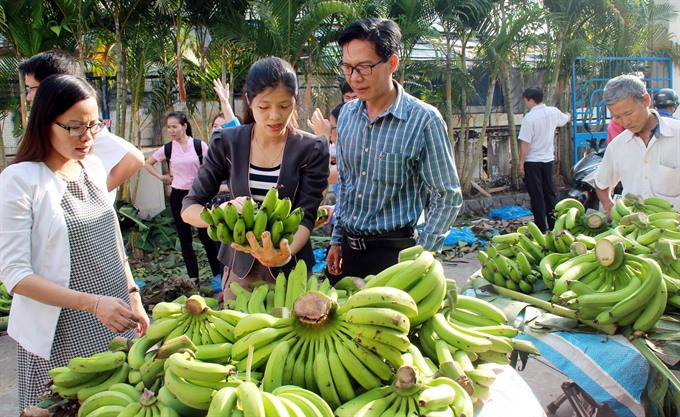 Vietnamese
Vietnamese
Price fluctuations trouble for farmers in Đồng Nai
Price fluctuations trouble for farmers in Đồng Nai
Fluctuations in the price of farm produce, due to a lack of long-term production planning and sustainable markets, are causing problems for many farmers in Đồng Nai.
 |
| Customers in HCM City buy bananas in front of HCM City University of Food Industry last month. Students at the university want to help banana growers in southern Đồng Nai Province.-VNA/VNS Photo Mạnh Linh |
Growers of Già Hương and Cấy Mô bananas, mostly in the districts of Trảng Bom, Thống Nhất, Định Xuân and Long Khánh, have been ready to harvest their produce since February, but traders, mostly in China, have stopped importing the fruit.
As a result, their prices have fallen to between VNĐ1,000 and VNĐ1,200 (US$0.04 to 0.05) per kilo, said Hoàng Thị Bích Hằng, chairwoman of the Farmer’s Union in the province at a recent forum on sustainable consumption of bananas.
Hương said two other kinds of bananas, Bơm and Sứ bananas, had not faced problems in sales because enterprises in the province buy them to dry for export.
But Già Hương and Cấy Mô bananas have not been selling.
In the same period last year, prices were more than VNĐ10,000 per kilo because demand from China was high. At the end of 2015, bananas in China were failing because of cold weather.
At that time, many Vietnamese farmers saw higher prices for Già Hương and Cấy Mô bananas compared to Bơm and Sứ bananas so they did not want to plant the latter. Instead, they cut trees and planted Già Hương and Cấy Mô.
According to economists, the demand from China since February has dropped because banana cultivation has recovered.
Local pig breeders are facing the same problem.
Prices have dropped sharply in recent months, affecting breeders raising over 2 million pigs.
Nguyễn Thị Loan, owner of a pig farm in Trảng Bom District’s Cây Gáo Commune, said she sold 100 pigs, weighing over 10 tonnes, at VNĐ26,000 (US$1.1) per kilo of live pig before Tết (Lunar New Year), the Tiền Phong (Vanguard) newspaper reported. “I suffered a loss of VNĐ100 million ($4,400) at this price,” she said.
Loan plans to sell another 100 pigs this month and if the price remains the same, at VNĐ26,000 ($1.1) per kilo, losses are unavoidable, given that the production costs for a kilo of live pig are VNĐ34,000-35,000 ($1.5).
But she has no choice because if she delays, the pigs will gain weight and it will be harder to sell them.
Nguyễn Hữu Kha, another pig breeder, said he borrowed about VNĐ1 billion ($43,800) to raise pigs. Now he is facing bankruptcy if the price remains at the low level.
Trần Văn Quang, head of Đồng Nai Province’s Livestock Production Department, said that last December, China had suddenly stopped importing pigs from Việt Nam.
Additionally, Quang said the price of pigs had been stable over the past three year, so local pig breeders decided to raise more, creating a glut.
Quang said farmers had ignored repeated warnings by the department about the surplus.
Tăng Kim Đoán, vice chairman of the Đồng Nai Province Livestock Association, said about 60 per cent of the pigs raised in the locality are sufficient to meet domestic demand and the rest depends on China’s market.
Solutions
In the short term, Đoán from the livestock association said the association had urged local animal feed companies not to raise their prices until the pig price stabilises.
According to experts, the domestic swine industry should be reformed to ensure stability and help breeders avoid losses.
Experts also advised breeders to co-operate with companies to invest in building farms, applying modern farming techniques and maintaining a sustainable consumption for their pigs.
Meanwhile, a series of measures are being taken to ‘rescue’ bananas.
The provincial agencies had worked with many organisations and associations in the province and HCM City to help farmers.
Big C on Wednesday launched its “No Profit Đồng Nai Banana” campaign.
The leading supermarket chain will purchase 100 tonnes of bananas, absorb transportation, logistics and marketing costs, and sell the fruit at retail prices of VNĐ5,900 per kilo at 15 stores around the country with all proceeds going directly to the farmers themselves.
Nguyễn Bách Việt of Sejong Việt Nam Company, which exports bananas to South Korea, said that in the upcoming days, he would visit farmers to check the quality of bananas and then look for traders in Korea to buy bananas.
The Startups and Administration Club has worked with the Việt Nam Social Welfare Centre for Adolescents and universities to organise a campaign called Charity Banana since February 22.
After eight days, around 300 tonnes of bananas were sold to help farmers, but the number only accounted for 10 per cent of the total real figure in the province.
In the Trảng Bom District alone, more than 4,000 tonnes are waiting to be sold.
Đỗ Long, chairman of the Startups and Administration Club, said: “It is urgent to carry out the campaign now. However, the activities of volunteers are not a sustainable way to produce higher consumption.”
Relevant agencies in districts with large areas of bananas will co-operate with authorities at industrial parks and export processing zones to buy bananas to be used as dessert served with lunches for their workers, he said.
Phạm Thái Sơn, head of the centre for enterprise relations at the HCM City University of Food Industry, said the school would work with other universities in the food industry and technology to research ways to process bananas into other products, Sơn said.
A student at the University of Food Industry is conducting research to use bananas in the processing of flour.

